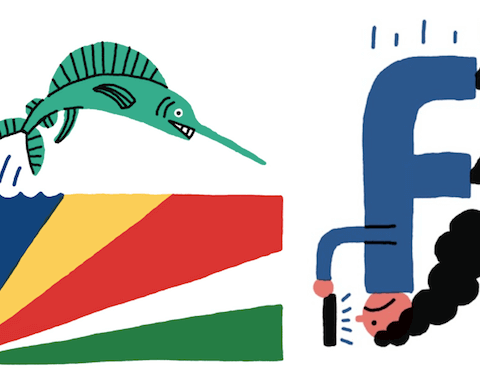Canada may be an environmental laggard on the global stage these days, but on the Internet it’s poised to become an eco-powerhouse.
The Internet Corporation for Assigned Names and Numbers (ICANN), the agency that regulates all Internet addresses, announced Tuesday that Vancouver-based social venture Big Room can have exclusive control and operation of a new Internet registry for the dot-eco top-level domain.
It means domain names like cars.eco and construction.eco – even corporateknights.eco – could soon be the home for new environmentally focused websites, and groups such as Greenpeace and 350.org could be part of the network approved to sell them.
It’s a landmark achievement for the little Canadian company, which was co-founded in 2007 by Jacob Malthouse, Trevor Bowden and Anastasia O’Rourke, who met while working together at the United Nations Environment Programme in Geneva.
Competition for the dot-eco extension has been intense. At one point a California-based company called Dot Eco LLC, backed by former U.S. vice-president Al Gore, was lobbying aggressively to be selected as operator of a dot-eco registry.
Not that Big Room was going to be intimidated. To be favoured by ICANN, applicants had to demonstrate a high level of community support for their bids. Big Room’s founders not only worked full time over the years building widespread support within the global environmental community, they also structured the for-profit company as a community-based social venture that has since been certified as a B Corporation.
“It’s operated more like a public-private partnership, so the community will be written into the contracts of ICANN,” explained Malthouse in an interview. “We’re a company, yes, but the community is in charge.”
That community is essentially a coalition of more than 50 environmental organizations from around the world, including WWF, Greenpeace, the Natural Resources Defense Council, the Carbon Disclosure Project, the David Suzuki Foundation, and Conservation International.
“It’s a huge coalition, one of the largest the environmental community has ever put together, and they all wrote in to support our application,” Malthouse added.
Green Cross International, a group founded by former Soviet Union president Mikhail Gorbachev, also threw its support behind Big Room. Eventually, Gore saw the writing on the wall and backed off, Malthouse speculated. “Once his team saw there was another application that was community-based and had the support of WWF and Greenpeace, I think he thought our approach was a better way to go.”
The former U.S. vice-president wasn’t the only one with a change of heart. Climate activist group 350.org, founded by U.S. environmental journalist Bill McKibben, initially supported the U.S.-centric Dot Eco bid but decided later to switch its allegiance to the broader-based Big Room.
In the end, Big Room had three competitors going after dot-eco – Planet Dot Eco LLC, which had some environmental backers, and two domain industry companies that just saw dot-eco as an opportunity to print money. Had Big Room failed to convince ICANN of its higher purpose, the process would have defaulted into an auction that would result in dot-eco going to the highest bidder.
That the Vancouver venture was successful has created excitement within the environmental community. “The potential for the global environment movement to collaborate like never before has been unleashed,” WWF International’s Richard McLellan said in a statement after learning of Big Room’s winning bid.
The Hard Work Begins
Winning control of dot-eco wasn’t easy, or cheap. The application fee alone was about $200,000, and additional funding was required for administrative and legal work, not to mention the time and effort that went into building a global coalition. Some social investors stepped up, providing the funding that Big Room needed.
But now, in many ways, the real work begins. “The community has a tonne of work to do to figure out how to do this right,” Malthouse said. “The important thing now is not to rush it, but to make sure the community has a model we’re all happy with.”
And when can organizations and individuals start registering for their dot-eco addresses? “I would hesitate to put a timeline on it, but sometime next year for sure. We have our work cut out for us to make sure this happens,” he added.
Good governance will be key. The coalition of environmental groups that backed Big Room calls itself the Dot Eco Community Organization (DECO), which has developed a set of by-laws aimed at unifying members around a common set of goals.
A community council of DECO members makes recommendations to its board, which works with Big Room to make sure the policies that result are put into practice. The International Institute for Sustainable Development, headquartered in Winnipeg, provides secretariat services for the coalition.
Big Room and the dot-eco council, co-chaired by WWF’s McLellan, have some difficult questions to answer before they launch the registry. If the dot-eco domain is to only be used for the greater good, how will that “good” be defined? Who can and can’t register a dot-eco extension?
Under what conditions, if any, can oil.eco or coal.eco be registered? Nuclear.eco and naturalgas.eco could be even more controversial. How will the community decide if a company, such as ExxonMobil or TransCanada, can register the dot-eco extension to their own brand names? Will so-called greenwashing be forbidden, and if so, how will this be monitored and enforced?
“There’s a whole discussion that needs to take place about what it means to be qualified as dot-eco,” said Malthouse. “We have to make sure we give the right access to the names, and eliminate squatting.”
On the other hand, the Big Room-operated registry has an opportunity to get quite creative with how dot-eco name extensions are sold. Typically, a registry approves registrars to sell the extensions. Malthouse said one option being considered is to allow established, trusted organizations like Greenpeace to become registrars – basically domain-name resellers – under an arrangement in which Greenpeace gets a percentage of the proceeds that it can put toward its own environmental initiatives and campaigns.
The rules for such an arrangement would have to be carefully crafted, but the benefits it could bring to the environmental community are potentially huge.
Dot-Eco Has Competition
An online environmental war of sorts is likely to take place over the next few years as dot-eco battles to be seen as more credible and popular than its rival dot-green domain, control of which was won by auction back in March by Afilias, the world’s second-largest domain registry.
Malthouse and others in the environmental community worry that dot-green domains will be sold to anyone willing to pay, and that this will result in a corporate rush to lock up dot-green extensions as part of industry greenwashing efforts. Websites such as coal.green and oilsands.green could soon be promoted on highway billboards, bus shelters, print advertisements and TV commercials.
Over time, this might not be a bad thing – as word spreads about the watered-down nature of dot-green domains, it could make dot-eco names that much more legitimate and respected in the eyes of consumers.
Dot-organic is another “green” domain that became available earlier this year, but it is more narrowly focused than dot-eco. While not community-governed like dot-eco, the dot-organic registry does require that any company applying for a dot-organic domain have products carrying a certified organic seal and be third-party qualified.
Other than the Canadian Internet Registration Authority (CIRA), which is the rule-setter and registry for dot-ca name extensions, Big Room is the only other Canadian organization that has exclusive registry status for a top-level domain.
Over the past few years, ICANN has considered nearly 2,000 applications for more than 1,000 top-level name extensions, ranging from dot-blog to dot-wine. Of those, 17 applicants – including Big Room – asked for a “community evaluation” as a way to lock up a domain extension before it goes to auction. A community evaluation is based on a 16-point scoring system. A score of 14 is required to pass.
Of those, only dot-eco, dot-radio, dot-hotel and dot-Osaka met or exceeded the 14-point threshold. One that surprisingly didn’t win approval was a group seeking to control dot-gay. As the U.K.-based news site The Register put it, “The application was, the evaluators complained, simply not gay enough.”







